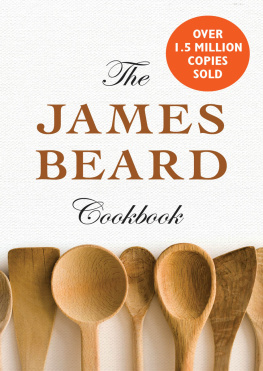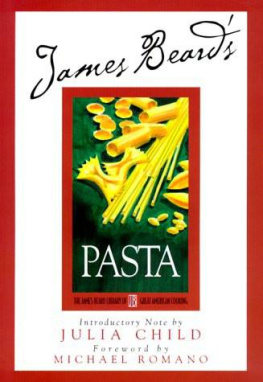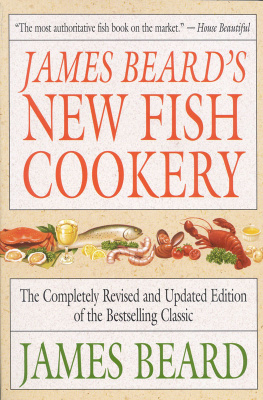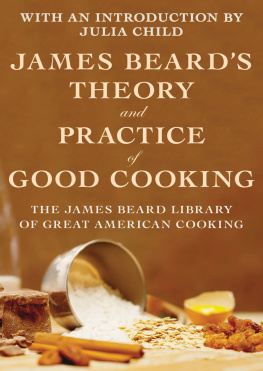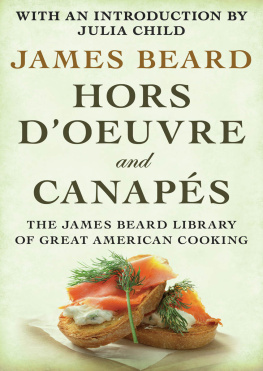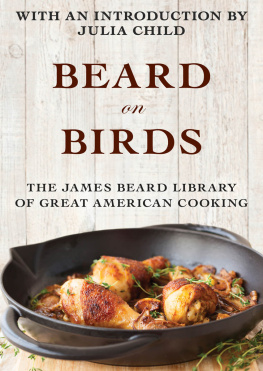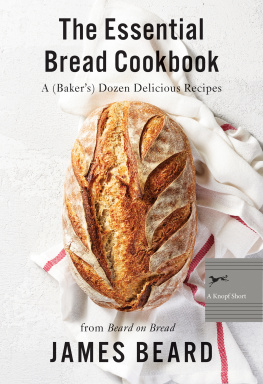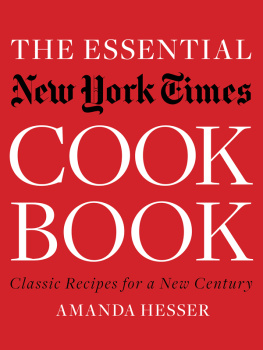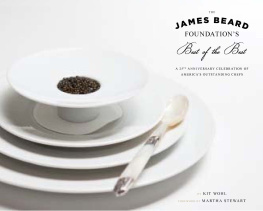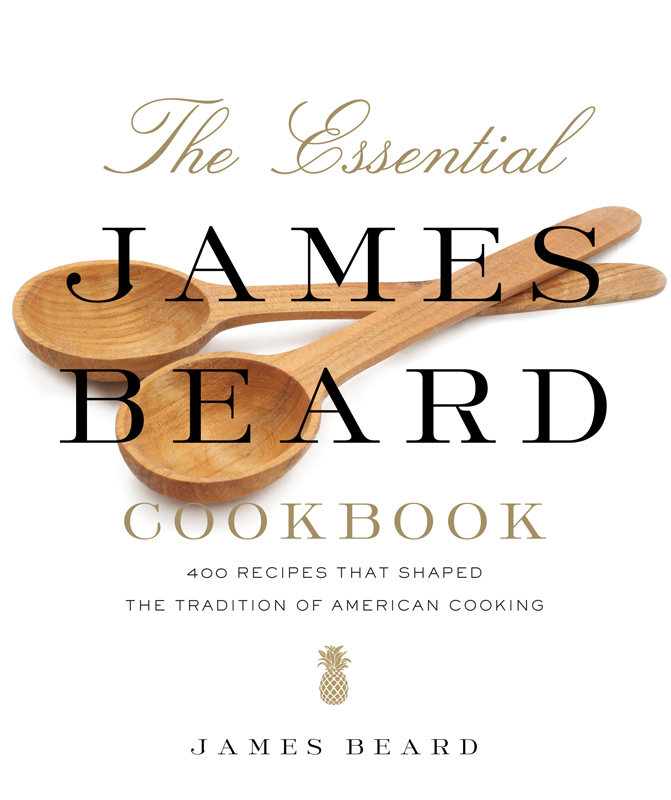
The author and publisher have provided this e-book to you for your personal use only. You may not make this e-book publicly available in any way. Copyright infringement is against the law. If you believe the copy of this e-book you are reading infringes on the authors copyright, please notify the publisher at: us.macmillanusa.com/piracy.
CONTENTS
ACKNOWLEDGMENTS
I am grateful to Elizabeth Beier at St. Martins Press, for asking me to take part in this celebration of James Beards work, and for introducing me to John Ferrone, the charming and erudite executor of Beards estate. Thanks also to Michelle Richter and Elizabeth Curione, for keeping the project on track. Copy editor Leah Stewart, proofreader Jane Liddle, and designer James Sinclair are consummate professionals, and their invaluable contributions show on every page of this book.
My partner, Patrick Fisher, and kitchen manager, Diane Kniss, took on the unenviable job of managing hundreds of recipes. The nuts and bolts of transcribing photocopies into Word documents fell to a dream team of food lovers, some of whom are also cookbook writers who brought their own appreciation of Beard to the chore: Peggy Fallon, Judy Kreloff, Johnisha Levi, Charles Pierce, Carl Raymond, Debbie Schulman, and Dd Wilson.
Rick Rodgers
FOREWORD
COOKING WITH JAMES BEARD
Dont gussy up spareribs with all that gunk, the chef boomed at us as we crowded around some naked ribs in the basement kitchen of his brownstone. Just sprinkle with plain salt and pepper and half an acre of garlic. At 6 feet 4 inches and three hundred pounds, the chef seemed to take up half an acre himself. He certainly took up most of the kitchen. This was thirty years ago, in the now revered James Beard House on Twelfth Street in Greenwich Village, where the owner gave cooking classes to small groups of amateurs over the decades. I knew in 1981 how lucky I was to be among them.
Thirty years before that, Id opened my very first cookbook, which happened to be The Fireside Cook Book of 1949. I was a newlywed and knew nothing. It was James Beard who taught me how to boil water, in my own language. He spoke to me directly. He gave me confidence. This was decades before Americans got all gourmeticized and learned how to cook French. Beard was as down-home American as easy side up and a cuppa Joe. He taught us to cook American, in our own kitchens, with the simplest of foods, like garlic and onions, and lemons and parsley, and bread. He taught us how to bake our own bread. This was new!
He wasnt a schoolmarm like Fanny Farmer, uptight about thrift and nutrition. Nor a phony marketing brand like Betty Crocker. He was real, he was male, and he was bighe talked big, he thought bigAmerican style. He spoke to guys outdoors at their grills and to gals indoors at their new electric stoves. He celebrated real food, what was fresh, and local, and growing anew after the deprivations of the Depression and the War. He celebrated our new sense of freedom, bounty, and largesse, both in his person and on the page. He was born to cook and to teach because he wanted to share his joy in being alive and savoring every sensuous moment, which is what food is for. Before Julia Child or Craig Claiborne or Jacques Ppin, or the hundreds of kitchen gurus who followed, Beard was the first to reshape the American palate at that moment of self-discovery when America found its new place in the world.
The place he came from mattered. Like Julia Child and M.F.K. Fisher, James Beard was a Westerner. Born thirteen and a half pounds on May 5, 1903, Beard learned to cook as he learned to breathe. His father, Jonathan, was a Mississippi gambler type who wore a red carnation, smelled of fine soaps and colognes, and was loved by all the ladies, Beard wrote. His mother, Elizabeth Jones, was an English adventuress turned hotel owner, who paused briefly at age forty-two to birth a son. She brought her child up the same way she ran her hotel, which was sold a few years before Jamess birth. Beard described her as That incredible woman who was my father.
That incredible woman had arrived in America at age sixteen, under the guise of governess, to travel through America and most of Europe and Central America before she settled in Portland, Oregon, and bought the Gladstone Hotel in 1896. Despite the hotels dignified name, Beard remembers Portland as a raunchy port of waterfront hearties and sporting ladies with their pimps. There were plenty of French and Italian immigrants to hire as hotel cooks, but they would catch gold fever and head for the Yukon to leave Mother Beard fuming among her pots. She finally solved the help problem by hiring Chinese, men like Let, Gin, Poy, and Billy, immortalized now in Beards recipes.
If hotel life was a natural theater, the landscape was a work of art. The waters teemed with Olympia oysters, Dungeness crab, razor clams, and Columbia River salmon. The woods were blue with huckleberries and blackberries. Tables were loaded with terrapin stew and chicken sauted with wild mushrooms. The Yamhill Street public market offered seasonally white raspberries, husk tomatoes, morels, lemon cucumbers, dozens of heritage apples. Italian truck gardeners brought in cardoons, fava beans, leeks, and Savoy cabbages.
With all this natural bounty at their command, Mother Beard and Let battled daily over the proper way to make aspic capon, or curries, applying the ancient arts of China, England, and France to the provender of western shores. Beard remembers Let brandishing a knife and Mother parrying with a stick of firewood. But such quarrels ended in laughter and renewed argument over the proper way to preserve a fig. They instilled in the wide-eyed child watching a love for food the most varied gastronomic experiences any child ever had. For an American child, it was a dream kitchen.
There was Lets Wonderful Sweet Cream Biscuit and My Mothers Black Fruitcake and My Fathers Favorite Pear Preserves. It was the great American amalgam, where Mother imported the muffin and crumpet rings of her youth so that Chinese Let could make perfect English crumpets,dripping with butter and daubed with our strawberry jam, as Beard wrote in his magnificent memoir, Delights and Prejudices . It was also a social amalgam of backyard, carside, and oceanside picnics. There were champagne parties, whist parties, bridge parties, fashionable luncheons and after-theater suppers. For a large fat boy, it was bliss.
He was so pampered, Beard recalls, that he became as precocious and nasty a child as ever inhabited Portland. His lifelong friend Mary Hamblet agreed that he was a holy terror on occasion but always so generous that to admire a toy was to be given it to keep. She also remembers what may have been his first culinary dish, as they played on the beach at Gearhart and made a sand pie. They frosted it with a pink marshmallow whipped with salt water. Eat it, said James.And I did, said Mary. Because I adored himand he was big.
Gifted with a taste memory as acute as perfect pitch, Beard remembers his first gastronomic moment: after hed crawled into a vegetable bin, he bit into a giant onion, eating it up skin and all. At three, sick with malaria, he remembers being fed a superb chicken jelly. At four, his father took him to dine out in Portland once a week so that he could begin to discriminate among restaurants. At five, his motherin a lapse of discretiontook him to a palace of high living called the Louvre, where he sampled French cuisine in a burgundy boudoir setting. And at all ages, his Chinese godfather Let took him to eat in Chinatown.



